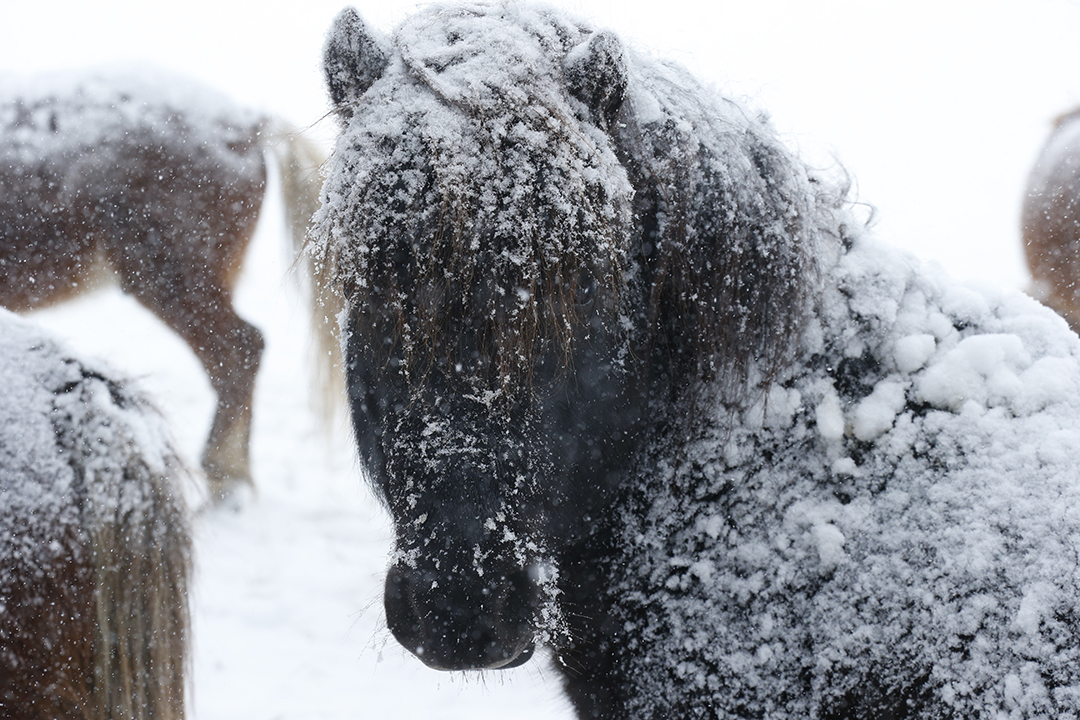
'No bad horse'
Unlike many who spend their careers working with horses, Dr. Sue McDonnell wasn’t always so keen on the equine species.
“I was familiar with horses, but it wasn’t really my sport or activity as a kid,” says McDonnell, who grew up on a dairy farm in rural Pennsylvania. “I first got involved seriously with horses as a professional when I went to graduate school, and I did my research with them.”
She’s now surrounded by horses, both at work and home. Besides holding a master’s degree in psychology and a PhD degree in reproductive physiology and behavior, McDonnell is a board-certified applied animal behaviorist. She’s also an adjunct professor and founding head of the Equine Behavior Program and Research Laboratory at the University of Pennsylvania School of Veterinary Medicine’s (Penn Vet) New Bolton Center campus.
Much of what she has learned about the natural behavior of horses is based on her observations of a semi-feral pony herd at UPenn’s New Bolton Center. Members of the herd, which she established 25 years ago, are kept on about 50 acres of pasture land. The ponies aren’t handled, and they’re allowed to breed and socialize as they naturally would.
McDonnell says observing semi-feral and feral herds has helped inform practices surrounding domestic horses. The New Bolton Center’s semi-feral herd draws people from around the world to study their behavior.
“Understanding the rhythm of how things go with horses is very valuable information,” says McDonnell. “A fair amount of compromised welfare can be attributed to people just not understanding [horses’] natural behavior.”
“There’s no bad horse, there’s just bad management.”
McDonnell’s role at Penn Vet’s New Bolton Center started as a researcher, but as the only person with formal training in animal behavior at the veterinary school, she soon found herself increasingly involved in behavioral cases.
“Until probably 10 years ago, most of the information put out about horses was incorrect, and there still is a segment of the industry where people will just sit down and write fiction about what horses do,” says McDonnell.
She adds that until recently, even veterinarians with equine-focused practices had little training in animal behavior: “I would be asked to videotape a horse and give an opinion on what I thought was happening. In many cases, [the veterinarians] weren’t sure whether there was a physical issue or just a misbehavior.”
McDonnell says this presented a void in veterinary teaching, so she decided to found Penn Vet’s equine behavior program.
“There, students learn what things could go wrong physically with the animal that would psychologically impair their function and may present itself as a behavior,” says McDonnell.
“Many times, the way we keep horses — and we think [it] is really state-of-the-art care — is actually not the best for them.”
While McDonnell teaches a wide variety of equine behavior traits, her true expertise is in stallion sexual behavior.
“Sometimes very valuable horses have difficulties transitioning from whatever career they had to breeding,” says McDonnell. “Often you can just manipulate their situation … to help them overcome their worries.”
Now, McDonnell works primarily with veterinarians and students to educate them about horse behaviors. In mid-February, veterinary students at the Western College of Veterinary Medicine (WCVM) and horse owners in Saskatchewan will have the opportunity to learn from McDonnell who will give several equine behavior presentations during her Canadian visit — including a public seminar on Feb. 14 during the 2020 Saskatchewan Equine Expo.
She says even simple things like the way a horse eats can have a substantial effect on their health and wellbeing. Unnatural eating habits can lead to colic, laminitis and other serious conditions as well as a wide array of behavioral issues such as anxiety.
“They’re meant to be eating continuously … and they should be moving while they’re eating,” says McDonnell.
“Grazing animals evolved to be moving and to be eating with their head down, and so when they are eating out of a hay rack and their head is up … it disposes them to physical and behavior problems.”
McDonnell says it comes down to education.
“Everywhere you go, you see people doing what they think is right, but it’s not really the way you should actually do it,” says McDonnell. “It’s just a matter now of educating people.”
Rigel Smith is a fourth-year student at the University of Regina’s School of Journalism and is the 2019 summer research communications intern at the WCVM.
